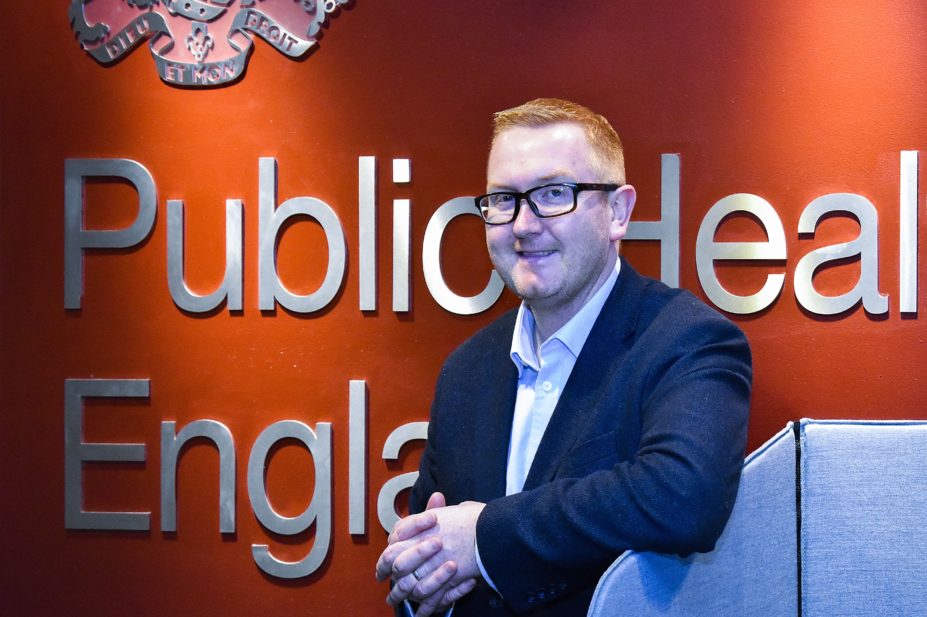
Julia Robinson
After suggesting we climb the five flights of stairs to his office at Public Health England’s (PHE’s) London headquarters — as opposed to taking the lift — it is clear that Jamie Waterall takes his role in preventing ill-health very seriously.
The
Pharmaceutical Journal is meeting Waterall to discuss a new programme that he is leading, entitled ‘
All Our Health’, which aims to educate healthcare professionals on the evidence for public health priorities, such as obesity, mental health and antimicrobial resistance.
Waterall is keen to emphasise the importance of pharmacy in the prevention drive in healthcare, although local pharmacies trying to squeeze funding for new services from cash-strapped local authorities may have a different impression.
PHE has been making positive noise around the role of pharmacy for several years. For instance, ‘Pharmacy: a way forward for public health’, published in September 2017, set out several ways that pharmacy could play a vital role in producing a healthier nation. The National Institute for Health and Care Excellence (NICE) has also said that community pharmacy teams have the potential to play a greater role in prevention — although discussions of the guidance on the ITV programme This Morning
, in which pharmacists were described as “pretend doctors”, revealed a discouraging lack of understanding about what pharmacists actually do.
We would love to try and manage as many people as we can by focusing on the behavioural risk factors that increase blood pressure
Waterall joined PHE when it was first established in 2013 and has since led the NHS Health Check programme, been national lead for cardiovascular disease (CVD) prevention and is currently deputy chief nurse. He is also chair of the National CVD Prevention System Leadership Forum, which aims to improve the prevention, early detection and management of high blood pressure, atrial fibrillation (AF) and high cholesterol.
The February 2020 edition of The Pharmaceutical Journal focuses on non-pharmacological interventions — how important are these for prevention of illness?
As an example of a non-pharmacological intervention, we would love to try to manage as many people as we can by focusing on the behavioural risk factors that increase blood pressure, such as obesity, physical inactivity, salt consumption and alcohol use.
In a good number of people, we can lower their blood pressure by focusing on those areas; however, there will be people that, despite managing those risk factors, will still need pharmacological intervention.
We don’t want to send the message to the professional community that pharmacological intervention is not important, as it clearly is — but it is important that we take the appropriate action for people at the right level. It may be the case that some individuals don’t want pharmacological intervention, which makes it even more important that we have something else to offer.
Public Health England has set out a range of opportunities for community pharmacies to play a role in public health, but are they being implemented?
The ‘Pharmacy: a way forward for public health’ document is really ambitious in terms of positioning pharmacy as the core deliverer of our future public health landscape. For the areas that the document sets out — the NHS Health Check programme, antimicrobial resistance, obesity and smoking — there’s no doubt that pharmacy is fundamental to achieving our ambitions around these.
There are great examples across the country where local authorities have commissioned pharmacy to try to reach deprived communities that aren’t going into general practices. I applaud the pharmacy community on its work around blood pressure, for example. Historically, we’ve really struggled to identify people with hypertension — we detect about 57% of the hypertensive population across the country; however, even once we detect them, only 56% are receiving the right treatment against NICE guidelines. We really want to up our game on that and we’ve set ambitious targets in that, by 2029, we will move both detection and management up to 80%. Pharmacy has got to be part of the solution to deliver that.
The British Heart Foundation has funded several pilots with pharmacy to test new approaches, such as ambulatory blood pressure monitoring. What will be valuable over the coming year or two will be to collate the evidence of how those approaches are working, and then the real challenge is how we spread that learning across the country.
The National Institute for Health and Care Excellence sparked controversy in January 2020 after it recommended pharmacists should start discussions about weight loss with customers — how can these conversations be broached?
We need to make sure that healthcare professionals have skills in motivational interviewing and health coaching
There is an anxiety among healthcare professionals around whether the public wants to be given that information. PHE commissioned the market research company Ipsos MORI to poll the public’s attitude and beliefs around receiving information from healthcare professionals about these issues. The evidence showed that the public welcomes those discussions, if done well.
We need to make sure that healthcare professionals have skills in motivational interviewing and health coaching. In the past, we’ve been quite paternalistic in the way that we provide information. The answer isn’t just telling somebody “you need to lose weight” or “you need to stop smoking” — most people know that those behaviours aren’t good for them.
The challenge going forward is for healthcare professionals to develop the skills that allow them to have good conversations that support people to find that motivation within them. We have to work out what works for that individual.
The ethos of the ‘All Our Health’ platform is thinking about ‘the place’. Often when you talk about the healthcare system, people gravitate to traditional clinical settings — hospitals, GP practices or care homes. What this tries to do is shift us beyond that — what is the role of the workplace, schools, the high street, the green space around us and so on.
What has been the impact of Public Health England’s guidance on the detection of cardiovascular disease and could the role of pharmacists eventually extend beyond blood pressure testing?
The ‘NHS long-term plan’ states that one of the areas where the NHS can save the greatest number of premature events is by addressing CVD. There’s the commitment in there that, over the next ten years, we’ll prevent 150,000 cases of heart attacks, strokes and dementia by tackling the big high-risk conditions — or ‘ABCs’: AF, blood pressure and cholesterol.
There are 23 pilot sites involving specialist anticoagulation pharmacists working on AF and the British Heart Foundation has put £2m into doing things differently for hypertension.
There’s also work going full steam ahead with NHS Digital to focus on developing a national audit for CVD, which we’ve never had in the past. We’ll take extract data from GP systems to understand how we’re delivering against this ambition. Most importantly, though, we don’t have health inequalities data, so I cannot tell you whether the diagnosis and treatment of individuals in a given area is better, worse or indifferent than the rest of the population. That’s a big worry for us.
The audit will allow us to finally look at the differences. I also want to look at other high-risk groups, such as black, Asian and minority ethnic communities, or to see if gender inequality exists in some areas. I think it is going to be really important; we have to understand the unwarranted variation and use that as a driver to improve our performance in some of these areas.
Do you support NHS England’s decision to explore whether high-dose statins could be supplied without a prescription in community pharmacies?
As Einstein said, we shouldn’t be unsurprised that if we do the same things, we get the same result. The idea of testing new approaches is an important one.
Like anything, you start by looking at the evidence, properly evaluating the service and understanding what difference it makes. But yes, I think we have to try doing things differently if we’re going to improve things.
A 2019 Public Health England policy paper described a “community pharmacy offer” for sexual health services that clinical commissioning groups and local authorities should commission, despite funding cuts. What is the justification for this?
There’s always a challenge in the healthcare system around how we do the best with the resources we have. But, there are great examples across the system where, despite challenges around resourcing, we are still reaching those individuals that would most benefit from the services.
I must admit I’m not close to the sexual health services and what’s being commissioned, but often it comes down to creativity and how we can do things differently, while maintaining quality and a focus on outcomes.
Recent discussions on ITV’s This Morning suggest that awareness of the role of community pharmacy is still very much lacking — what do you think needs to be done to raise pharmacy’s profile among the public?
That doesn’t correlate with our research with Ipsos Mori — something like 84% of the public said that they had confidence in pharmacists to support them around public health issues. Pharmacists are trusted, valued members of society. I think it’s great that pharmacies are being recognised for their important role in public health, and I see that ever growing.
You talk a lot about new initiatives, but is Public Health England planning to fund any new pilots to convince commissioners that community pharmacy is the place for them?
PHE traditionally hasn’t been the commissioner of services. The role of PHE is supporting the system, looking at the evidence and advising government. The main commissioner of services is local government. We obviously play a crucial role in the oversight of the public health grant that is given to local authorities, including the NHS.
I can’t think of an example where PHE has funds to commission pilots or services. What we would do is advocate recognising the important role of pharmacy. So, in my area of CVD, we’ve repeatedly raised the importance of pharmacy in our documents.
- A correction was made on 5 February 2020 to reflect that Jamie Waterall is no longer national lead for CVD prevention at PHE and is now chair of the national cardiovascular disease prevention system leadership forum.

